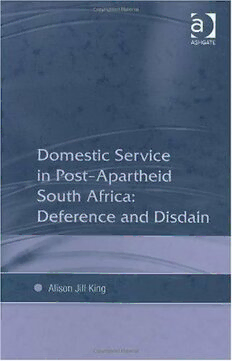
Domestic Service in Post-apartheid South Africa: Deference and Disdain PDF
227 Pages·2007·1.34 MB·English
Most books are stored in the elastic cloud where traffic is expensive. For this reason, we have a limit on daily download.
Preview Domestic Service in Post-apartheid South Africa: Deference and Disdain
Description:
Universally domestic workers have been a marginalized sector of the workforce, increasingly feminized and whose working lives often reflect abuse, degradation and exploitation. Set within the context of post-apartheid South Africa, the author examines the lives of women in domestic service to discover whether the dismantling of apartheid has ameliorated the poor pay and conditions of this marginalized workforce. The release of Nelson Mandela from Robben Island 1990 marked a momentous event in South Africa's turbulent history and the beginning of the transition from oppression to a free and democratic society. Ten years on the author felt there was a need to discover if the hopes and aspirations of so many liberated Africans were now being realized in concrete experiences. She chose domestic service within South Africa as an effective means to answer these questions. Following on from Jacklyn Cock's seminal work "Maids and Madams", the author draws on research carried out in the Eastern Cape and places these workers in the wider societal context in order to examine their 'quality of life' in addition to their 'quality of work'.
See more
The list of books you might like
Most books are stored in the elastic cloud where traffic is expensive. For this reason, we have a limit on daily download.
